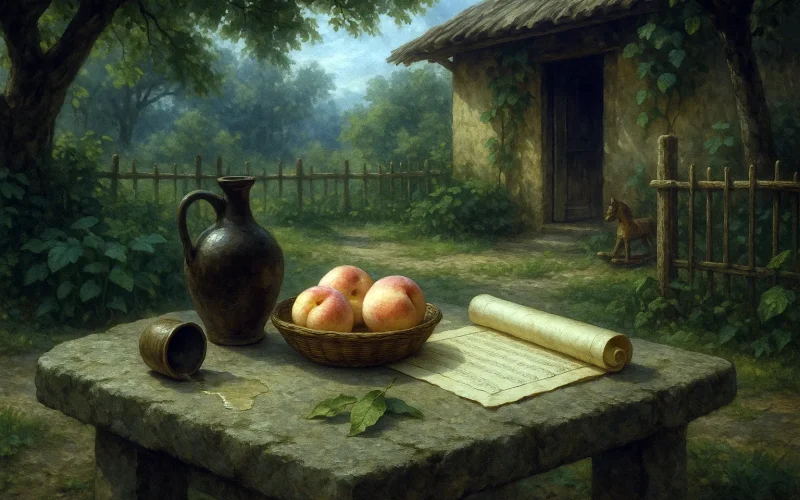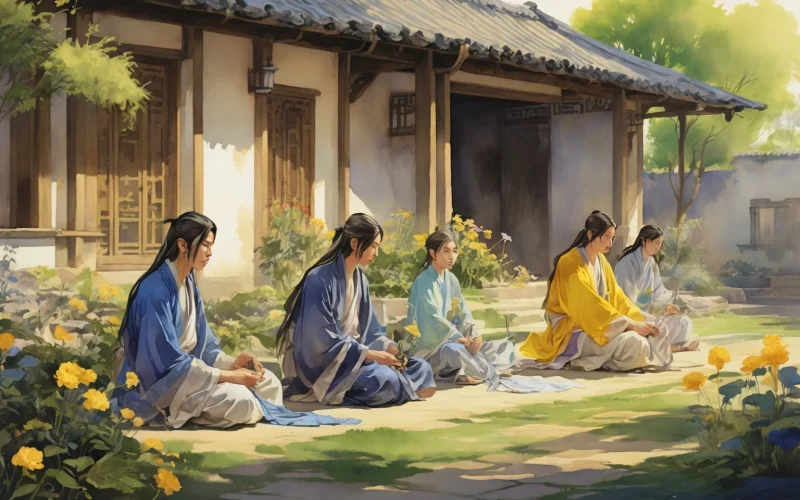Living within the city bound,
I pass my days freely at leisure.
I take a seat on shady ground,
Or stroll within the gate with pleasure.
I only eat my herbage fine
And enjoy playing with my son.
I never abstrain from drinking wine;
Without wine, life is joyless one.
At night in bed I can't well stay;
Nor can I rise with rising sun.
If I abstain from day to day,
No harm to my health will be done.
I knew that unhappy I'd feel,
But not what good is done to me.
Now I know abstinence brings weal,
I will abstain today with glee.
If I could abstain as I'm told
Until I reach celestial spheres,
A young look would replace the old
And youth might last a thousand years.
Original Poem
「止酒」
陶渊明
居止次城邑,逍遥自闲止。
坐止高荫下,步止荜门里。
好味止园葵,大懽止稚子。
平生不止酒,止酒情无喜。
暮止不安寝,晨止不能起。
日日欲止之,营卫止不理。
徒知止不乐,未知止利己。
始觉止为善,今朝真止矣。
从此一止去,将止扶桑涘。
清颜止宿容,奚止千万祀。
Interpretation
Composed in 402 AD when Tao Yuanming was thirty-eight years old, this poem was written during his leisurely stay in his hometown near Shangjing (present-day Jiujiang, Jiangxi). At this time, having achieved modest stability in life though unsuccessful in official career, and prompted by frail health and family concerns, the poet humorously documented his attempt to quit drinking in "On Quitting Wine." The entire poem revolves around the character "止" (to cease), naturally weaving daily life with the struggles of abstinence, revealing both the poet's witty personality and his profound attachment to wine amidst inner conflict.
First Stanza: "居止次城邑,逍遥自闲止。坐止高荫下,步止荜门里。"
Jū zhǐ cì chéng yì, xiāo yáo zì xián zhǐ. Zuò zhǐ gāo yīn xià, bù zhǐ bì mén lǐ.
I dwell near the town's edge, free and at ease in my leisure. I sit beneath tall shade to rest, stroll within my humble gate.
The poet paints a tranquil rural life in understated yet carefree tones.
Second Stanza: "好味止园葵,大懽止稚子。"
Hào wèi zhǐ yuán kuí, dà huān zhǐ zhì zǐ.
The finest flavors are garden mallows, greatest joy lies with children.
This captures simple domestic pleasures, reflecting his unpretentious approach to living.
Third Stanza: "平生不止酒,止酒情无喜。"
Píng shēng bù zhǐ jiǔ, zhǐ jiǔ qíng wú xǐ.
Never in life have I stopped wine—to quit now brings no joy.
A candid confession of his dependency and the gloom of abstinence.
Fourth Stanza: "暮止不安寝,晨止不能起。"
Mù zhǐ bù ān qǐn, chén zhǐ bù néng qǐ.
At night, no peace in sleep; at dawn, no strength to rise.
Vividly portrays the physical and mental discomfort of withdrawal.
Fifth Stanza: "日日欲止之,营卫止不理。"
Rì rì yù zhǐ zhī, yíng wèi zhǐ bù lǐ.
Each day I resolve to quit, yet my vital forces rebel.
Further expresses the bodily dysfunction during this struggle.
Sixth Stanza: "徒知止不乐,未知止利己。"
Tú zhī zhǐ bù lè, wèi zhī zhǐ lì jǐ.
I know only quitting's grief, not yet its benefits.
Reveals his conflicted understanding of abstinence's value.
Seventh Stanza: "始觉止为善,今朝真止矣。"
Shǐ jué zhǐ wéi shàn, jīn zhāo zhēn zhǐ yǐ.
Now I see quitting as good—today I truly stop.
The tone shifts from hesitation to resolution, full of self-persuasion.
Eighth Stanza: "从此一止去,将止扶桑涘。清颜止宿容,奚止千万祀!"
Cóng cǐ yī zhǐ qù, jiāng zhǐ fú sāng sì. Qīng yán zhǐ sù róng, xī zhǐ qiān wàn sì!
Henceforth I cease completely, as if reaching Fusang's shore. Fresh features replace wine-worn looks—why care for endless years?
Exuberant hyperbole for self-encouragement, blending humor with longing for renewal.
Holistic Appreciation
Centered on the motif "止," the poem's concise phrasing and rhythmic flow create folk-song charm. With earthy humor and self-deprecation, Tao authentically records his psychological journey—from attachment and anguish to realization and resolve. Rich in pastoral atmosphere, it balances leisurely vignettes with philosophical reflection. The celestial imagery in the conclusion adds whimsical uplift, revealing through plainness deep sincerity and through simplicity profound wit, showcasing both his love for wine and his transcendent spirit.
Artistic Merits
The poem's formal brilliance lies in its cascading parallel structure, with the recurring "止" establishing unique cadence and playful coherence. Content merges self-disclosure with life wisdom, depicting rustic scenes while conveying inner health pursuits. Its vernacular liveliness embodies the freshness of folk ballads, exemplifying Tao's signature style—"seemingly plain yet richly elegant, apparently lean but substantially nourishing."
Insights
This work enlightens us that breaking habits—though painful—requires recognizing true needs and long-term good. Through lighthearted naturalism, Tao demonstrates how even reluctant choices can be faced with openness and humor, embracing life's adjustments while preserving spiritual freedom.
Poem translator
Xu Yuanchong (许渊冲)
About the poet

Tao Yuanming(陶渊明), 365 – 427 CE, was a poet, literary figure, fu writer, and essayist active during the late Eastern Jin and early Liu Song dynasties. Born in Chaisang (near present-day Jiujiang, Jiangxi Province), he pioneered a new genre of pastoral-themed literature, expressing profound philosophical insights through simple language. His poetic style became an enduring aesthetic standard in classical Chinese poetry.











